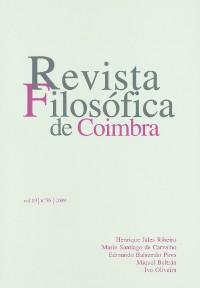Please use this identifier to cite or link to this item:
https://hdl.handle.net/10316.2/33358| DC Field | Value | Language |
|---|---|---|
| dc.contributor.author | Beltrán, Miquel | - |
| dc.date.accessioned | 2014-09-09T09:52:10Z | |
| dc.date.accessioned | 2020-09-24T11:28:42Z | - |
| dc.date.available | 2014-09-09T09:52:10Z | |
| dc.date.available | 2020-09-24T11:28:42Z | - |
| dc.date.issued | 2009 | - |
| dc.identifier.issn | 0872-0851 | - |
| dc.identifier.uri | https://hdl.handle.net/10316.2/33358 | - |
| dc.description.abstract | En las cartas que Spinoza escribió a Willen van Blijenbergh tratando de resolver algunas de las cuestiones que éste le plantea, acerca de la naturaleza del mal y la caída del primer hombre, hallamos la asombrosa teoría según la cual estaba en la naturaleza del fruto del árbol del bien y del mal, el que si se comiera de él, quien lo hiciere caería en la consideración de las cosas del mundo de modo diferente a como Dios lo hace. Además del estupor que esta afirmación le causa, Blijenbergh no encuentra explicación tampoco para el hecho de que, desde el estado de perfección inicial que se le supone a Adán, su voluntad pudiera mostrarse incapaz de obedecer el mandato divino, pero la razón de ello es que no hay tal mandato, según sostiene Spinoza, sino una advertencia acerca de la nocividad del fruto, que Adán, haciendo caso omiso de la misma-pues no la juzga como tal- decide finalmente probar. | spa |
| dc.description.abstract | In the letters that Spinoza wrote to Willen van Blijenbergh, trying to answer some of the questions the latter presented to him concerning the nature of evil and the fall of Adam, we find the theory that the nature of the fruit was such that anyone who ate from it would see the worldly things in a different way as God does. Besides the astonishment that this affirmation caused him, Blijenbergh doesn’t find an explanation for the fact that, from his original state of perfection, Adam’s will could be unable to obey the divine order, a problem that, according to Spinoza, doesn’t exist, because there is no such an order but just and advice concerning the harmfulness of the fruit that Adam, ignoring it – for he doesn’t judge it as advice- finally decides to eat. | eng |
| dc.language.iso | spa | - |
| dc.publisher | Faculdade de Letras da Universidade de Coimbra, Instituto de Estudos Filosóficos | - |
| dc.subject | Adán | - |
| dc.subject | Dios | - |
| dc.subject | Árbol | - |
| dc.subject | Bien | - |
| dc.subject | Mal | - |
| dc.subject | Fruto Prohibido | - |
| dc.subject | Mandato | - |
| dc.subject | Adam | eng |
| dc.subject | God | eng |
| dc.subject | Evil | eng |
| dc.subject | Good | eng |
| dc.subject | Tree | eng |
| dc.subject | Forbidden Fruit | eng |
| dc.subject | Prohibition | eng |
| dc.title | Spinoza y el arbol de la ciencia del bien y del mal | por |
| dc.type | article | - |
| uc.publication.collection | Revista Filosófica de Coimbra vol. 18, nº 36 | - |
| uc.publication.firstPage | 297 | - |
| uc.publication.issue | 36 | - |
| uc.publication.lastPage | 313 | - |
| uc.publication.location | Coimbra | - |
| uc.publication.journalTitle | Revista Filosófica de Coimbra | - |
| uc.publication.volume | 18 | por |
| dc.identifier.doi | 10.14195/0872-0851_36_4 | - |
| uc.publication.section | Artigos | - |
| uc.publication.orderno | 5 | - |
| uc.publication.area | Artes e Humanidades | - |
| uc.publication.manifest | https://dl.uc.pt/json/iiif/10316.2/33358/241638/manifest?manifest=/json/iiif/10316.2/33358/241638/manifest | - |
| uc.publication.thumbnail | https://dl.uc.pt/retrieve/11647209 | - |
| item.fulltext | With Fulltext | - |
| item.grantfulltext | open | - |
| Appears in Collections: | Revista Filosófica de Coimbra | |
Files in This Item:
| File | Description | Size | Format | |
|---|---|---|---|---|
| rfc36_artigo5.pdf | 4.28 MB | Adobe PDF |  |
Items in DSpace are protected by copyright, with all rights reserved, unless otherwise indicated.
